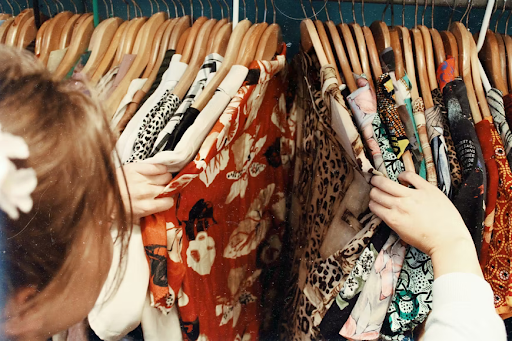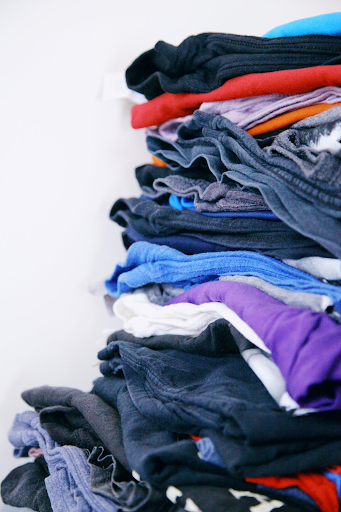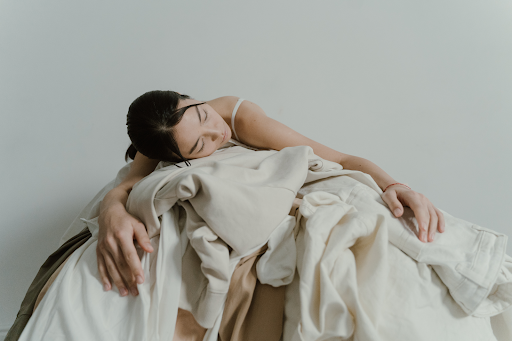If you think you have too many clothes, this is the guide for you. We’re going to dive deep into this problem, including how to clear the clutter.
In my role as a life coach, I am always helping clients create a life that suits their hopes and dreams better.
That’s why I’m keen to share this guide with you.
So, let’s dive in.
21 Tips To Radically Declutter
1. How Do I Know If I Have Too Many Clothes?
It’s subjective whether to say someone has too many clothes or not. Ultimately, if you think you have too many clothes, you’re probably right. This is the kind of problem that some people can be in denial about though, so I’ve listed some common signs you have too many clothes below.
2. Signs You Have Too Many Clothes
Here are some objective clues that you probably have too many clothes.
You Keep Clothes You Barely Wear
This is perhaps the most obvious tip. I’ll refer back to it throughout the article. Perhaps you even have items you’ve only worn once or twice! I’ll also address why the excuse that “I’ll wear it one day” doesn’t stand up.
You Have Trouble Storing Your Clothes
If you’re running out of room to store your clothes, that’s one of the clearest signs that you have too many. Are all your drawers full? Do you have boxes of old shoes or bags of pants and jeans in your spare room? Are your shirts creased because there’s nowhere to hang them?
These are all signs of a problem that needs fixing. Clutter can hause more havoc on your mental health than you realize.
You’ve Forgotten What Clothes You Have
If an item regularly turns up in your wardrobe that you’ve barely worn and completely forgot about, that’s another sign. Most people don’t find clothes after forgetting about them for months or years.
You Have Clothes That You Don’t Like
If your wardrobe is packed with clothes you don’t like, that’s a clear sign that you’re probably an impulse buyer. Bonus points if the clothes have barely been worn. In future, focus on clothes that you really love or really need. You should be able to see yourself wearing this new item for many years.

You Never Wear The Same Clothes To An Event Twice
Again, you might think it’s completely necessary to never wear the same outfit to social events, but I’ll present an opposing argument later.
It Takes Too Long To Get Dressed In The Morning
This can happen if you have too many options for what to wear, or if you can’t find that one outfit you really want to wear. Either way, taking too long to get dressed is another common sign that you have too many clothes.
Overwhelmed By Too Many Clothes
If you feel overwhelmed by the sheer amount of clothes in your wardrobe, that’s another sign that you have more items of clothing than necessary.
3. What Do You Do If You Have Too Many Clothes?
As previously mentioned, having too many clothes is subjective. So, the first thing you need is to accept that you have too many. The final step is then to get rid of the clothes, but that’s not always easy, so let’s explore some in-between tips for those struggling.
4. Give Away The Clothes You Don’t Like
Donate them to a charity shop, sell them on eBay, give them to a friend. Perhaps you can return items to the shop in some instances? We’ll explore the pros and cons of these options later on.
For now, just know that there’s little value in keeping clothes you don’t like, even if you’re convincing yourself you’ll be wearing that ugly shirt one day.
5. How To Choose What Clothes To Get Rid Of If You Like All Of Them
This is a common excuse from clothes hoarders. But it’s rarely completely true. So, here’s a question to ask to help you decide which clothes to get rid of.
“How often do I wear this?”
Long story short, you should be getting rid of clothes that you wear the least.
The clothes that are slightly damaged or those that no longer fit are also obvious candidates to get rid of. This is especially true if they’re too big for you. Back yourself to not put on that weight again.
6. Find Your Why
I’m not saying it will be easy to give away your clothes, even when you’ve logically conceded which outfits you barely wear. You may still feel more comfortable keeping these items in your wardrobe.
There are many reasons why you’ll hang onto these clothes, and we’ll explore these later.
For now, I want you to focus on why you’ve decided to downsize your wardrobe.
Like anything that’s difficult, finding your why can give you the motivation needed to move forward.
7. Think Of What Else You’d Spend The Money On
You might feel good wearing new clothes, but is there something you really want in life that you can’t afford in this moment? Selling your clothes could help you make a significant jump towards your dream purchase. Plus, with the emergence of websites like eBay and Gumtree, it has become easier than ever to sell the clothes you’re not wearing at a good price.
8. Experience The High Of Generosity
Maybe you feel you don’t need the funds you could potentially raise from selling your clothes. If so, perhaps you can focus on what you’d do with less clutter and more room in your home. If not that, perhaps you can focus on how good it may feel to donate an outfit to someone who isn’t as financially fortunate.
They’ll feel great for having a fancy new item of clothing, and you’ll feel great for giving it away. That’s better than letting it sit in your wardrobe having barely been worn. Try it at least once.
There are plenty of charities that could use the money raised from selling it in their shops too, so you could get your high of generosity that way.
9. Learn About The Benefits Of A Minimalist Lifestyle
There are plenty of men and women who have adopted a minimalist lifestyle who insist it makes them happier. The basic idea is that they learn they don’t need a lot of stuff to be happy. You can read a detailed guide about the minimalist lifestyle in my guide on extreme minimalism.
10. Why Do I Keep Buying Too Many Clothes?
It’s no good getting rid of clothing if you can’t kick the habit of buying new clothes whenever you walk past a shopping mall. Perhaps it’s better first then to consider why you’re always buying clothes and how to kick this habit.
11. How To Give Up Retail Therapy
We all have our habits to cope with the stresses of life. Some of us turn to junk food. Others rely on drugs and alcohol. Buying clothing is another habit that we use as a method of coping with stress. Perhaps you’ve heard of the phrase “retail therapy”.
It’s not as bad for your physical health as other coping methods, but it might be hurting your life financially. Plus, you might be struggling to store and wash this mountain of clothes you’ve acquired.
The first step to giving up your vices is to accept that it’s a problem. Then, you need to find a way to deal with whatever is stressing you out. Either that or you need to find a healthier way to cope with the stress. This guide on stress tolerance can be a good start.
12. Work On Your Self-Esteem
I’m not saying everyone with too many clothes to wear has a self-esteem problem.
However, it’s true that a huge proportion of the fashion industry is built upon customers who aren’t happy with who they are or how they think the world views them.
They make purchases to feel better about themselves, rather than because they need a particular clothing item to wear.
This is especially true of people who spend more money than they can afford on “high end” items.
WIth that in mind, this list of self-love hacks could be the cure to your retail therapy problem.

13. You Don’t Know Your Own Personal Style
This is typically a confidence problem, not a style problem.
Confident people are aware what clothes make them feel good and wear these. These are the type of people to remain confident even if they wear the same outfits for years and years.
Unconfident people often buy whatever is “in style”. They take their style tips from other people, in the hopes they’ll appear cool to others. The problem is: when the world decides these clothes are “out of style”, the unconfident person stops wearing them. Then, before they know it, they have a wardrobe full of clothes they don’t wear.
14. How To Stop Emotional Spending
As we’ve explored, some people buy new clothes to cheer themselves up. Some people get super-excited when they see a clothing item and buy it on impulse. Both fall under the category of emotional spending.
The best way to curb this habit is to give yourself a week between seeing an item and buying it. If after a week, you decide you still want it, go ahead and buy it. After all, whatever emotion you felt when you first saw the item will have passed.
15. Understand Your Emotional Spending Triggers
If you’re guilty of buying clothes you don’t need, pledge to make a note of what emotions you felt immediately before shopping for new clothing. When you understand your emotional spending triggers, you can prepare yourself better to not spend when you feel these emotions again in future.
16. Should I Sell Sentimental Items Of Clothing?
It’s helpful to look at sentimental items of clothing the same way as drinking “just one” beer.
Is keeping it going to harm your life or frustrate you? Does keeping it keep you further away from your ultimate dreams? If not, go ahead and indulge.
In this case, there’s nothing wrong with keeping that old wedding dress or the football shirt you never wear. But if it’s damaging your life in any way, it’s a better idea to find the strength to get rid of these sentimental outfits you never wear.
17. How Do You Get Rid Of Clothes Hoarding?
Extreme hoarding often occurs as a result of a mental health problem or a psychological disorder.
People with such issues might struggle to remove any stuff from their wardrobe, even if the advice in this blog post makes logical sense to them.
In many cases, the best way forward is to speak with a certified therapist, who will be able to identify and help cure the underlying issues causing this behavior.
18. Too Many Clothes In The World?
It’s not so common to consider the environmental impact of the world’s fast fashion culture, but the end result is that more clothes end up in landfill. You can do your bit to help the planet by shopping less, wearing your current clothing more and supporting charity shops when you are ready to buy or give stuff away.
19. How Many Clothes Does The Average Person Have?
The average American woman owns 30 outfits, according to data from Forbes. Meanwhile, the average American family spends $1,700 on clothes per year. Perhaps you can use this data as a baseline to decide whether you do own too many clothes.
20. How Many Clothes Should A Person Have?
There are too many factors at play to give a one-size-fits-all answer. For example, some people need a separate set of business clothes, while others can wear a casual shirt and a pair of jeans as work clothes. People in some countries need separate winter wardrobes, while others can wear t-shirts and shorts all year round.
Hopefully, this guide has helped you work out whether you have too many clothes, considering your current lifestyle.
21. Girlfriend Has Too Many Clothes
Did you find this article because you suspect your girlfriend has too many clothes? Does she have more designer bags, shoes accessories than she’ll ever need? More shoes than she’ll ever wear? Do you worry that it’s hurting her and your kids financially? If so, I hope this article has given you some logical strategies to help her realise she has this problem.

Perhaps your best shot is to send her this article and point out the parts that affect her situation. Don’t feel guilty about doing so. You’re trying to help.
Any Questions?
Thanks for reading my blog post. If you liked it, feel free to share it with your friends, post it on your social media profiles and all that other good stuff.
If you’d like to ask a question or make a point about this topic, feel free to post a comment below.
I can’t help but feel good all the time when I hear from my readers, so give me the gift of your opinions.
It will be great to hear from you!
